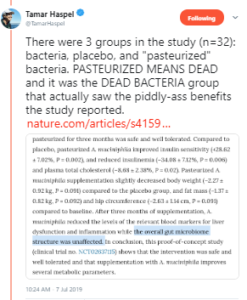Industry-funded study of the week: “probiotic” weight-loss supplement
I spotted some tweets about this study from Washington Post writer Tamar Haspel, who has a sharp eye for this sort of thing. Her first tweet said:

Her second tweet explained the problem:

So of course I had to look up the study. It’s not one I would ordinarily have noticed because its title does not use the word “probiotic,” which typically refers to the live bacteria (in yogurt, for example). The evidence for benefits of probiotics is iffy, so this study raises lots of questions.
Let’s take a look at it:
The Study: Supplementation with Akkermansia muciniphila in overweight and obese human volunteers: a proof-of-concept exploratory study. Depommier C, et al. Nature Medicine (2019)
Conclusion: I’ve left out the statistics to make this easier to read: “Compared to placebo, pasteurized A. muciniphila improved insulin sensitivity…, and reduced insulinemia…and plasma total cholesterol…. Pasteurized A. muciniphila supplementation slightly decreased body weight…compared to the placebo group, and fat mass…and hip circumference…compared to baseline….In conclusion, this proof-of-concept study…shows that the intervention was safe and well tolerated and that supplementation with A. muciniphila improves several metabolic parameters.”
Competing interests: Five of the authors “are inventors of patent applications…filed with [patent offices in at least 12 countries]…dealing with the use of A. muciniphila and its components in the context of obesity and related disorders.” Two of the authors are cofounders of A-Mansia Biotech S.A., a Belgian company that sells A. muciniphila supplements, presumably as weight-loss supplements.
Comment: As Haspel points out, the subjects in this study were given either (a) live bacteria, (b) Pasteurized (and, therefore, mostly dead) bacteria, or (c) a placebo. The Pasteurized ones were associated with metabolic benefits and weight loss. Pasteurization is what gets done to milk to kill most—not all—of the living bacteria it contains. In this study, Pasteurized bacteria had the same effect on the microbiome as the unpasteurized. The point of the study was to show that the Pasteurized supplement would induce weight loss; the observed loss, however, was not statistically significant. Nature Medicine‘s editors should know better. So should the New York Times’ editors. Haspel points out that the New York Times account of the study accepted its conclusion uncritically, headlining it “A Probiotic for Obesity?” At least the headline included a question mark. The article did not mention the authors’ patents or conflicts of interest; it should have.
Bottom line: If you want to keep your microbiome healthy, eat a healthy diet.

